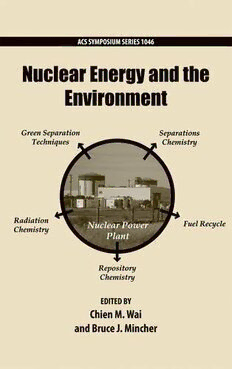
Nuclear Energy and the Environment PDF
421 Pages·2010·11.418 MB·English
Most books are stored in the elastic cloud where traffic is expensive. For this reason, we have a limit on daily download.
Preview Nuclear Energy and the Environment
Description:
A renewed global interest in nuclear power is underway due to concerns about the contribution of combustion of fossil fuels to climate change and the unreliability of the supply of fossil fuels. Nuclear power is currently an important source of carbon-free, safe, and domestic energy in many countries. However, concerns about nuclear waste disposal and the proliferation of nuclear weapons have hindered its expanded use and continued development. As world demand for energy continues to rise, it is recognized that nuclear energy will be required to meet this demand in an environmentally sustainable manner. Responsible management of nuclear wastes, more efficient processes for conversion of uranium to energy, and effective and secure techniques for recycling used nuclear fuel are some of the key issues which must be addressed in order to develop sustainable nuclear energy technologies for the 21st century. This book is based on the papers presented at a recent and very successful symposium entitled Nuclear Energy and the Environment held at the 238th American Chemical Society (ACS) National Meeting in Washington, DC, August 16-20, 2009. The 3-day ACS symposium was well attended with participants from Canada, France, Germany, Japan, Sweden, Taiwan, and the USA discussing research ideas and progress in separation of actinides and fission products, green separation techniques, radiation effects, and repository chemistry. This book starts with an overview of challenges in actinide separation chemistry for advanced nuclear fuel cycles and roadmaps of new cleanup technologies by the U.S. Department of Energy. It is followed by 3 sections covering recent research and development in separations chemistry, radiation chemistry, and repository chemistry. The book documents reasons to be optimistic for the future of nuclear power and challenges facing nuclear scientists and engineers today.
See more
The list of books you might like
Most books are stored in the elastic cloud where traffic is expensive. For this reason, we have a limit on daily download.
